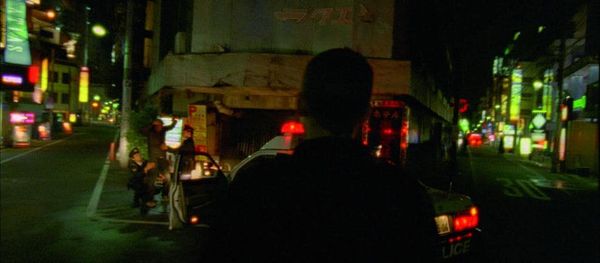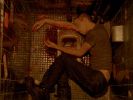Eye For Film >> Movies >> Enter The Void (2009) Film Review
Enter The Void
Reviewed by: Andrew Grant

Cinematic provocateur Gaspar Noé is perhaps rivaled only by Lars von Trier in his ability to divide audiences and critics alike into two radically feuding factions. His 2002 film Irreversible, with its extended rape sequence, nausea-inducing stroboscopic effects and inverted narrative is easily one of the most confrontational and unsettling films of all time, and a perusal at the film’s IMDB board reveals that its polarising effects continue to be discussed and argued. Now, seven years later, Noé returns with his latest feature, Enter The Void, a psychedelic epic that while not as overtly provocative as his past efforts, is significantly more audacious.
Speaking in Berlin recently, Noé explained how this is the film he wanted to make for many years, but could not find the funding. Inspired equally by an early childhood viewing of Kubrick’s 2001: A Space Odyssey and his own personal odyssey into the world of psychotropic drugs, Enter The Void is a cinematic wonder; a day-glo postmortem avant-garde mind-trip that for some will be enlightening, while others will find it to be little more than an endurance test.

Set entirely in the seedy, dark underbelly of a Tokyo that is the antithesis of the prim and pristine city depicted in Lost In Translation, the film’s wafer-thin plot tells of Oscar (Nathaniel Brown), a part-time DJ and drug dealer who has recently been reunited with his sister Linda (Paz de la Heurta) after years of being separated due to the death of their parents. A drug deal gone sour leads to Oscar’s death, and so begins our journey into the afterlife.
With the exception of some mirror shots, we don’t see much of Oscar as the entire first third of the film is literally from his point of view, a conceit first used in Hollywood in the 1947 noir, Lady In The Lake. We get to experience his blinks, as well as the colorful fractal-geometry hallucinations brought on by a dose of DMT. This perspective doesn’t change after his death, but as an aimlessly wandering spirit, the camera is no longer restrained by the physical limitations of the living. A ghostly voyeur, Oscar travels over the Tokyo skyline to peek in the activities of his stripper sister as well as his various friends as they deal with the news of his unexpected death. Of course, being a Noé film, there are graphic stops along the way in an abortion clinic, a handful of rooms in a Love Hotel, and, yes, inside a uterus.
Interspersed throughout the film are flashbacks to Oscar and Linda’s childhood and the tragic accident that tore them apart, as well as the events of the days and weeks leading up to his demise. An extended tracking shot early on finds Oscar walking the streets with a French friend, discussing The Tibetan Book Of The Dead, which serves as a roadmap for the rest of the film. Subtle it’s not, and the whole cycle of life philosophy and realisation of the interconnectedness of things that Noé presents for 160 minutes (or 135, depending on which version your country distributes) is simplistic, to say the least.
Yet that’s not to imply that the film isn’t successful. It may lack the moral agenda of Irreversible, which was built around a declaration that “Time destroys everything” and an argument that the will to savagery is innate. This is Noé working in less rational territory – his attempt at visualising the experience of a drug trip and tapping into the third-eye perception. Familiar stuff for anybody who’s ever dabbled in hallucinogenic drugs.
Having done away with the disturbing audible shocks of I Stand Alone and the graphic violence of Irreversible, this is in many ways a much more mature Noé, even though the material may be lacking a substantive discourse. Much like 2001: A Space Odyssey, this is a work of remarkable self-indulgence, but just as Kubrick succeeded in his aspirations, so does Noé.
This is a case where form does exceed content, but rightly so. The sensory overload of the opening credits sequence is something of a tease, for the visual and aural banquet that follows is nowhere near as punishing, save for a few moments. That the film packs an emotional punch is perhaps its biggest surprise, and it allows for a great deal of forgiveness for the wooden performances and stilted dialogue. Like the thematic archetypes explored (birth, life, sex, death) this is cinema at its most primal – an orgy of sound and vision that explores and exploits the medium to its very limits.
NB: As mentioned above, there are two versions of the film in release. The original cut, as shown at the Cannes Film Festival runs at 161 minutes, while the shorter version is 137 minutes. Rather than merely trimming some of the longer psychedelic sequences, the shorter version loses some poignant scenes that go far in giving the film a greater emotional depth. Even at 137 minutes, the film is anything but brisk, and I can’t imagine that a saving of 24 minutes is going to result in a larger fan-base. Those who don’t like the film will tune (or walk) out within the first 30 minutes.
Reviewed on: 23 Sep 2010


















